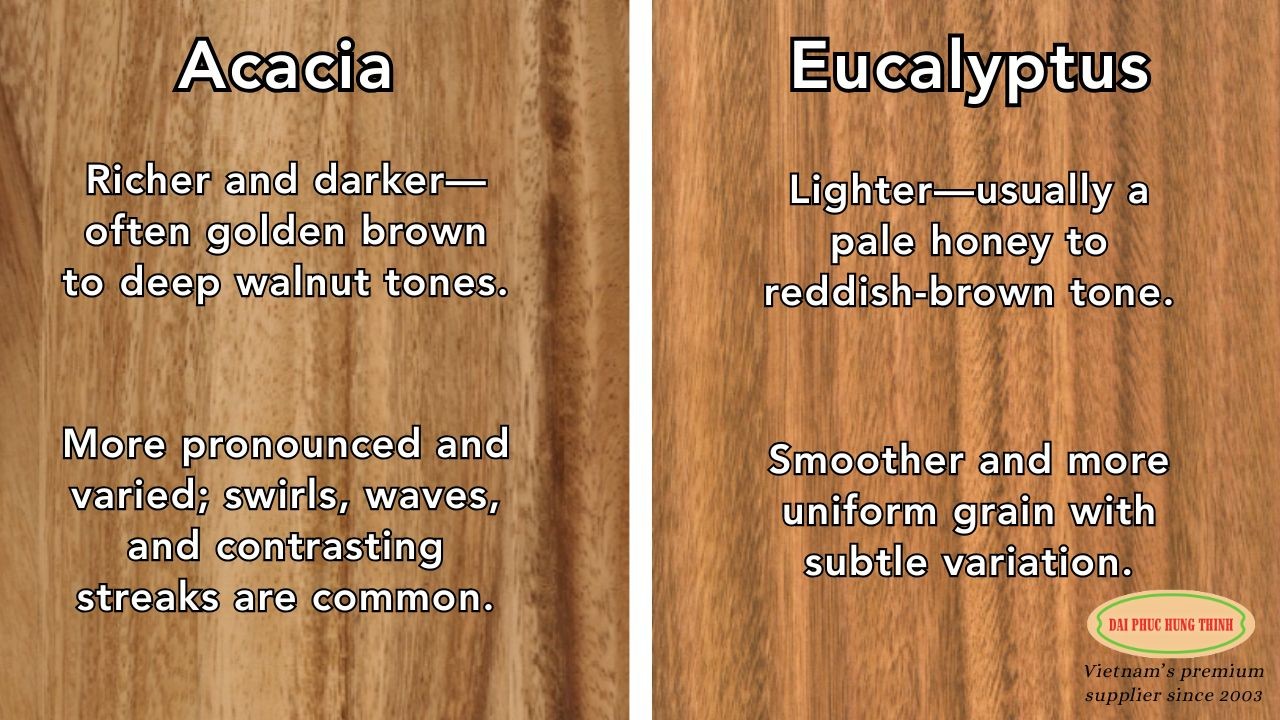If you've spent any time researching outdoor furniture, you've probably noticed two wood types that come up again and again: Acacia and Eucalyptus. They're everywhere—from premium garden lounges to foldable patio sets—and for good reason.
These two hardwoods offer an exceptional balance of beauty, durability, and sustainability. But which one is better for your backyard, balcony, or terrace? And why are they the go-to materials for so many outdoor furniture manufacturers?
In this guide, we’ll break down the science behind their popularity, how they perform in real-world weather conditions, and how to care for them—whether you’re in the UK, Germany, or North America.
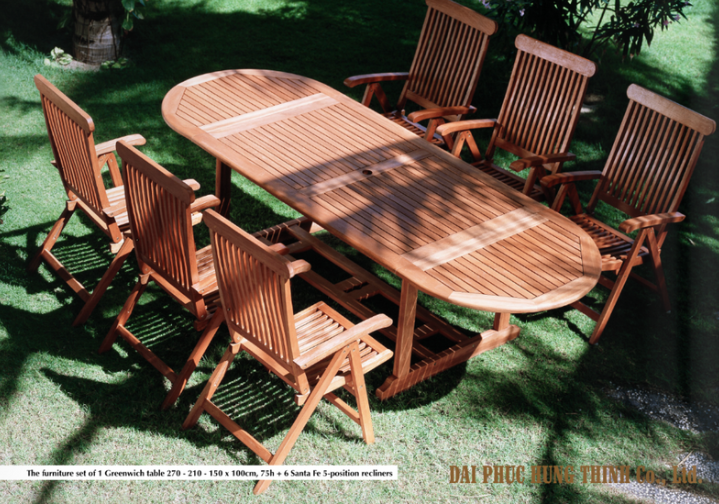
Why Wood Choice Matters for Outdoor Furniture
Outdoor furniture isn’t just about design—it’s about how well it stands up to the elements. Sun exposure, rain, frost, and humidity can all take a toll on poorly chosen materials. That’s why professional Vietnamese furniture factories and retailers worldwide rely on hardwoods like acacia and eucalyptus. Both are naturally resilient, dense, and loaded with oils and compounds that help them resist decay, pests, and warping.
But they’re not the same—and choosing the right one for your climate and lifestyle matters.
Acacia Wood: Dense, Durable, and Naturally Weather-Resistant
Acacia is one of the hardest hardwoods used in outdoor furniture wholesale—ranking between 1,700 and 2,200 on the Janka scale (a scientific measure of wood hardness). This makes it highly resistant to dents, scratches, and physical wear. It also has a tight, uniform grain, which means it absorbs less moisture and is less prone to swelling or splitting.
Naturally rich in oils, acacia repels water and fungi without needing heavy chemical treatments. That’s why it’s so widely used in furniture made in Vietnam, where local manufacturers produce FSC-certified acacia pieces designed for export to Europe and North America.
It performs especially well in hot, dry climates like Southern California, Spain, and central U.S. states. And while regular oiling is recommended to preserve color and reduce checking, acacia is a low-maintenance yet high-performance choice for outdoor living.
Eucalyptus Wood: Lightweight, Stable, and Built for the Outdoors
Eucalyptus is another top pick among Vietnam furniture manufacturers—particularly for its dimensional stability. With a Janka hardness around 1,120, it’s softer than acacia but still plenty durable for everyday outdoor use.
What makes eucalyptus unique is its high tannin content, which naturally deters moisture and insects. It holds its shape well and doesn’t shift or crack as easily when exposed to humidity, making it a popular option in coastal climates or areas with frequent rain, like the UK, Northern France, and the Pacific Northwest.
Eucalyptus is also fast-growing and commonly plantation-farmed, which is why it's easy to find as an FSC-certified option from trusted outdoor furniture manufacturers. However, it may require slightly more frequent oiling than acacia to maintain its golden-brown tone and protective finish.
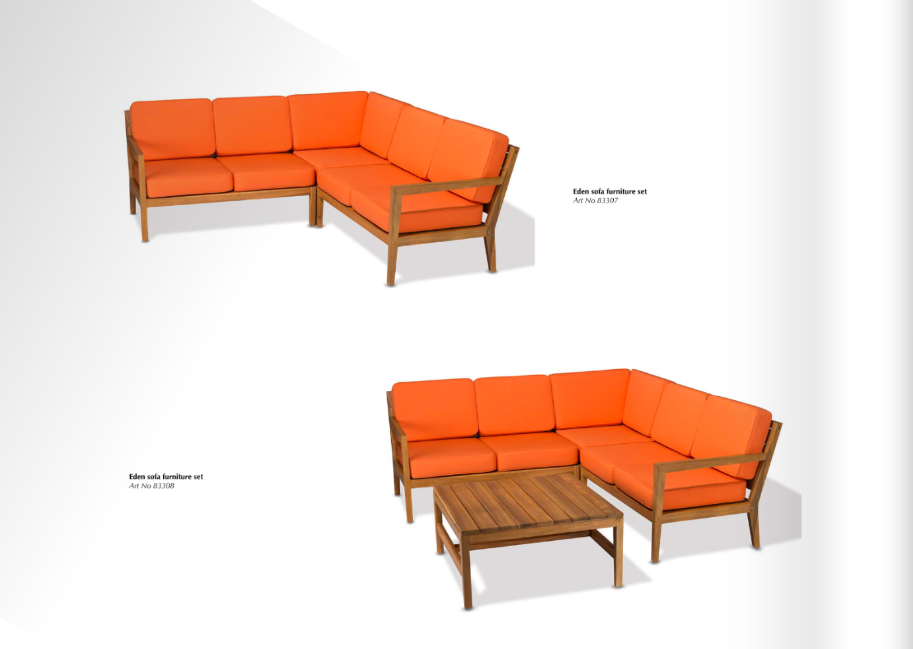
Above: The Eden sofa furniture set made with 100% FSC-certified sustainable Eucalyptus by Dai Phuc Hung Thinh Furniture
Visual Differences: Acacia vs. Eucalyptus Wood
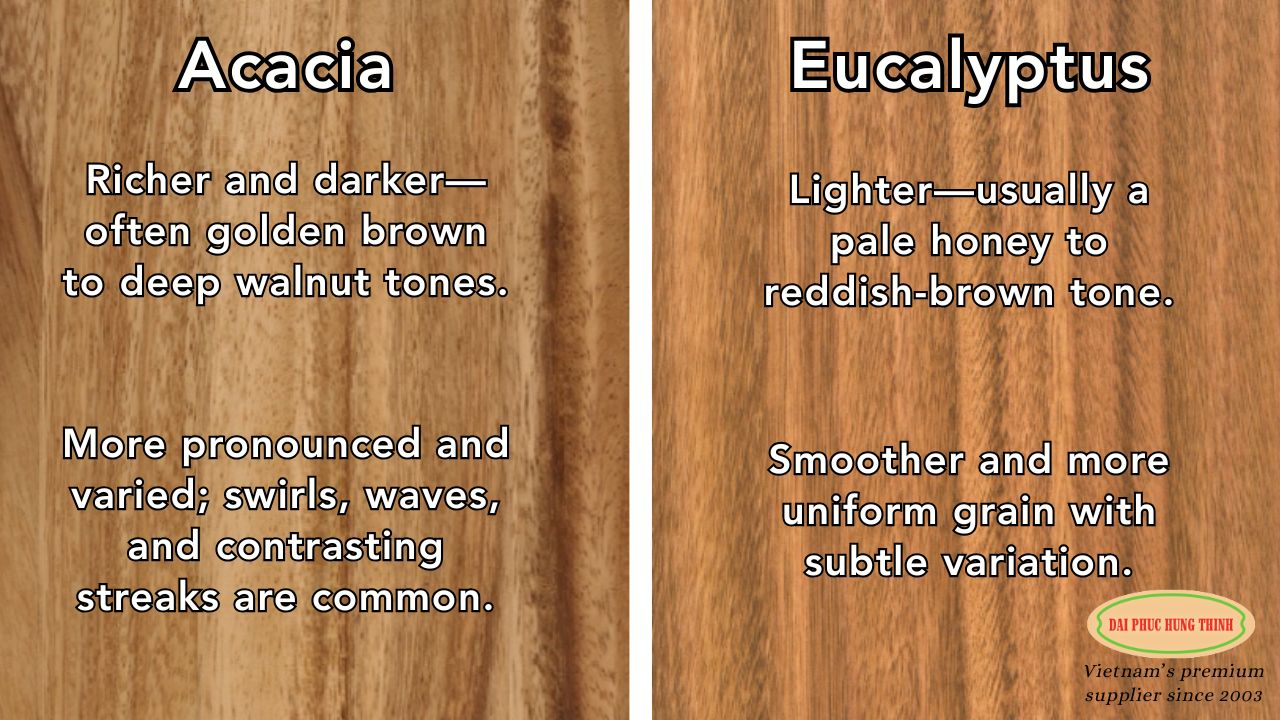
-
Color Tone
-
Acacia: Richer and darker—often golden brown to deep walnut tones.
-
Eucalyptus: Lighter—usually a pale honey to reddish-brown tone.
-
-
Grain Pattern
-
Acacia: More pronounced and varied; swirls, waves, and contrasting streaks are common.
-
Eucalyptus: Smoother and more uniform grain with subtle variation.
-
-
Finish Appearance
-
Acacia: Often has a natural sheen even before oiling; darker oils deepen its contrast beautifully.
-
Eucalyptus: Tends to look more matte or muted unless regularly oiled.
-
-
Aging / Weathering
-
Acacia: Grays slowly if left untreated, maintaining more visible grain as it ages.
-
Eucalyptus: Develops a soft silver-gray patina more quickly in outdoor conditions.
-
How They Compare in Different Climates
| Climate Type | Acacia Performance | Eucalyptus Performance |
|---|---|---|
| Hot & Dry (e.g. California, Spain) | ✅ Excellent | ✅ Good |
| Humid or Coastal (e.g. UK, Seattle) | ✅ Good | ✅ Excellent |
| Cold Winters (e.g. Canada, Germany) | ⚠ Store or cover | ⚠ Store or cover |
| Year-Round Sun (e.g. Florida, Texas) | ✅ Excellent with oiling | ✅ Excellent with oiling |
Note: Both woods should be covered or stored indoors during freezing weather to avoid moisture penetration and fiber stress.
Maintenance Tips for Long-Lasting Beauty
Both acacia and eucalyptus are low-maintenance compared to untreated woods—but they’ll last even longer with a few simple seasonal steps:
-
Clean regularly using warm water, mild soap, and a soft brush
-
Oil the surface every 2–3 months during sunny seasons with a teak or hardwood oil
-
Avoid harsh cleaners or power washers—they strip protective oils
-
Use covers that are UV-resistant and breathable, not plastic tarps
-
Store indoors or under shelter during heavy snow or prolonged rain
-
Raise the legs off damp ground or concrete using rubber feet or risers
Following these tips can extend the life of your furniture by 5–10 years or more.
A Note on Sustainability
One of the key reasons acacia and eucalyptus are so widely used in outdoor furniture—beyond their beauty and durability—is their sustainability. Unlike slower-growing hardwoods like teak, which can take 20–30 years to mature, acacia and eucalyptus trees typically reach harvestable size in just 7–10 years.
This faster growth cycle makes them more renewable and reduces the pressure on old-growth forests. Both woods are widely available from FSC-certified plantations, making them a smart choice for environmentally conscious consumers and retailers alike.
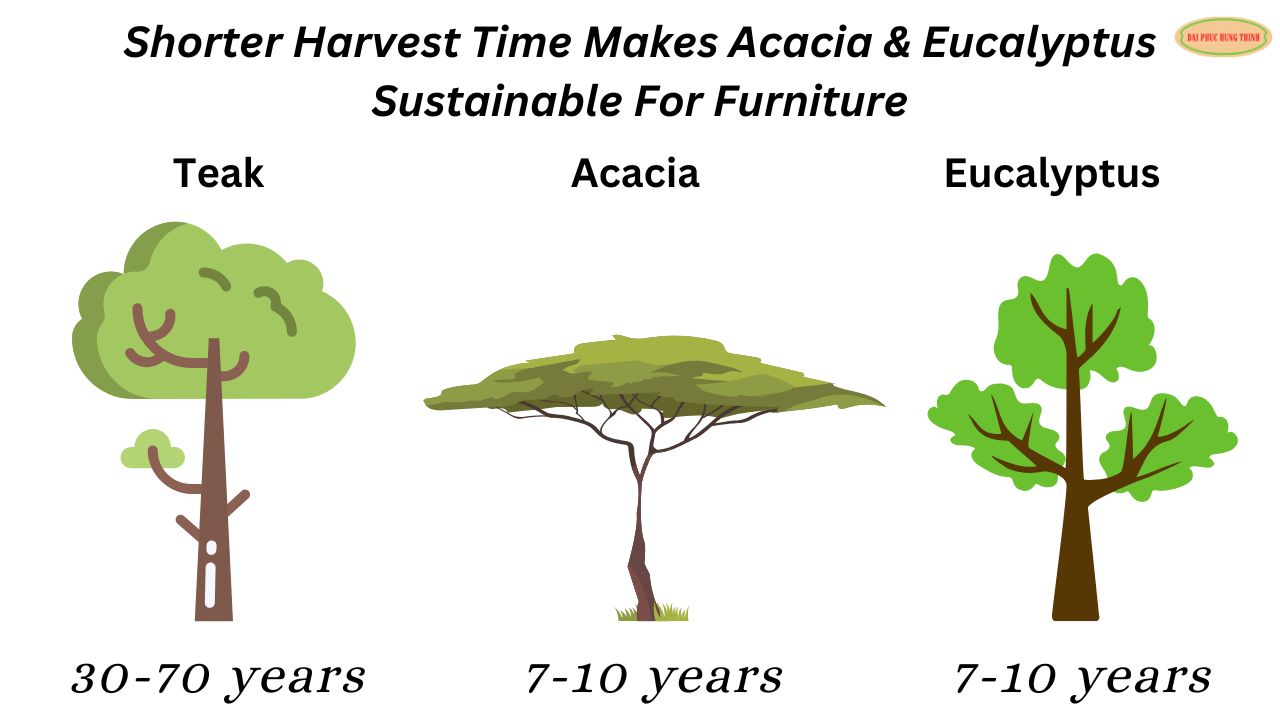
So, Which One Should You Choose?
Choose Acacia if:
-
You live in a dry, hot, or sunny region
-
You prefer dramatic grain patterns and a slightly darker wood tone
-
You want a denser, more scratch-resistant surface
-
You’re okay with light maintenance and oiling
Choose Eucalyptus if:
-
You live in a humid or coastal climate
-
You want excellent stability with fewer seasonal cracks
-
You prefer a lighter wood tone and softer texture
-
You don’t mind more frequent oiling to keep the finish fresh
Final Thoughts
Both acacia and eucalyptus are popular with outdoor furniture manufacturers for good reason: they’re beautiful, sustainable, and naturally built to withstand the elements. Whether you're furnishing a garden in Berlin, a rooftop terrace in Chicago, or a backyard in Bordeaux, these hardwoods offer a reliable blend of science and style.
With just a bit of seasonal care, your acacia or eucalyptus furniture will look great and perform well for many summers to come.
At Dai Phuc Hung Thinh Furniture, we’ve specialized in FSC-certified sustainable acacia and eucalyptus outdoor furniture for over 22 years. As a family-owned business based in Vietnam, we’ve proudly supplied to respected European retailers like JYSK and Segmuller, and our collections are trusted by homeowners and professional buyers alike.
📩 Retailer or buyer? Contact us to explore our latest outdoor ranges or request a catalog at sales@daiphuchungthinh.com.vn
🪑 Shopping for your own home? Ask your local furniture retailer if they carry Dai Phuc Hung Thinh products—crafted for performance, designed for real life.


